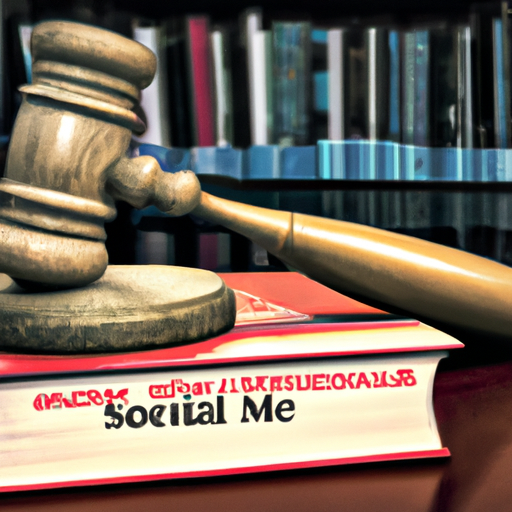In today’s digital age, social media has become an integral part of our lives, both personally and professionally. As businesses strive to reach a wider audience, they often turn to social media platforms to promote their products and services. However, navigating the world of social media can be a daunting task, especially when it comes to legal considerations. From copyright infringement to defamation, there are various legal issues that businesses may encounter while advertising on social media. That’s where a reliable and experienced social media service comes in. This article aims to shed light on the importance of seeking professional guidance in managing and resolving legal claims related to social media. By addressing common concerns and providing informative answers, businesses can make informed decisions and protect their online presence. So, how can a social media service assist you? Read on to find out.
Understanding Social Media Service Claims
Social media service claims refer to legal actions taken against social media platforms or individuals for various issues arising from the use of these platforms. These claims can involve defamation, privacy violations, intellectual property infringement, and other legal disputes related to the use of social media services. It is essential for businesses and individuals to understand these claims and their implications to protect their rights and interests in the digital age.
Why are Social Media Service Claims Important?
Social media service claims are crucial because they address the potential harm that can occur in the modern world of online communication. With the widespread use of social media platforms, individuals and businesses are exposed to various risks, including reputational damage, loss of business opportunities, violations of privacy, and infringement of intellectual property rights. Social media service claims provide a legal avenue for victims to seek justice and obtain compensation for the harm they have suffered.

Common Types of Social Media Service Claims
-
Defamation Claims: Defamation refers to false statements that harm a person’s reputation. Social media platforms may be held liable for defamatory content posted by their users if they fail to remove it after receiving notice.
-
Privacy Violation Claims: Social media platforms have a responsibility to safeguard user privacy. Claims involving privacy violations may arise when platforms disclose personal information without consent or fail to protect user data adequately.
-
Intellectual Property Claims: Users on social media platforms may infringe upon copyrights, trademarks, or patented inventions. Social media service claims related to intellectual property seek to protect the rights of creators and businesses.
-
Cyberbullying and Harassment Claims: Social media has given rise to online harassment and cyberbullying. Victims may pursue legal action against individuals or platforms responsible for facilitating these harmful behaviors.
Legal Considerations for Social Media Service Claims
Navigating the legal landscape of social media service claims requires a thorough understanding of the relevant laws and regulations. Important considerations include:
-
Jurisdiction: Determining the appropriate jurisdiction for filing a social media service claim can be complex, as these platforms often have a global reach. Locating the responsible party and pursuing legal action in the right jurisdiction is essential.
-
Statute of Limitations: Each jurisdiction has specific time limits within which a claim must be filed. Missing the deadline could result in the loss of the right to seek compensation.
-
Platform Liability: Social media platforms are typically protected by Section 230 of the Communications Decency Act, which limits their liability for user-generated content. However, there may be exceptions when platforms are aware of unlawful content or fail to address reported violations.
-
Defenses: Defendants in social media service claims may assert defenses, such as truth, opinion, fair use, and lack of intent, to mitigate liability.
Proving Social Media Service Claims
Requirements for Proving Social Media Service Claims
To successfully prove a social media service claim, certain requirements need to be met:
-
Duty of Care: Plaintiffs must show that the social media platform or individual had a duty of care to protect them from harm, such as exercising reasonable measures to prevent defamatory or infringing content.
-
Breach of Duty: It must be demonstrated that the defendant breached their duty of care, either by allowing harmful content or failing to take appropriate action upon notification.
-
Causation: Causation establishes a direct link between the defendant’s actions or inactions and the harm suffered by the plaintiff. It must be proven that the social media service directly caused the harm.
-
Damages: Plaintiffs must provide evidence of the actual harm, such as financial losses, reputational damage, emotional distress, or other measurable damages.
Evidence and Documentation
Collecting and preserving evidence is crucial in social media service claims. This may include screenshots or archives of offending posts, timestamps, witness statements, expert opinions, and records of communication with the social media platform or the individual responsible for the harmful content. Documenting the impact of the harm on the plaintiff’s business or personal life is also essential in establishing the extent of damages.
Expert Witnesses in Social Media Service Claims
In complex social media service claims, expert witnesses can provide valuable insights and support. Experts in areas such as digital forensics, cybersecurity, online reputation management, or intellectual property can help analyze evidence, explain technical concepts to the court, and lend credibility to the plaintiff’s claims. Their expertise can significantly strengthen a plaintiff’s case and increase the chances of a favorable outcome.
Challenges in Social Media Service Claims
Difficulties in Establishing Damages
Quantifying damages in social media service claims can be challenging. While reputational damage and emotional distress are valid forms of harm, they can be subjective and challenging to assess monetarily. Gathering evidence and presenting a compelling narrative that links the harm suffered to the defendant’s actions is essential to overcome this challenge.
Jurisdictional Issues in Social Media Service Claims
Determining the appropriate jurisdiction for social media service claims can be complex due to the global nature of these platforms. The choice of jurisdiction can significantly impact the outcome of a case, as laws and regulations vary across different countries. Legal counsel with expertise in international laws and jurisdictional issues is crucial when dealing with cross-border claims.
Liability of Social Media Platforms
While social media platforms enjoy certain legal protections under Section 230, they may still be held liable in certain circumstances. If a platform is aware of defamatory or infringing content and fails to remove it, they may be considered a publisher of that content and lose their immunity. Additionally, claims related to privacy violations or inadequate data protection measures can also expose platforms to liability.
Defenses Against Social Media Service Claims
Defendants in social media service claims can assert various defenses to challenge the allegations made against them. These defenses may include truth (if the statement is factually accurate), opinion (if the statement is an expression of opinion rather than a statement of fact), fair use (if copyrighted material is used for purposes such as commentary or criticism), or lack of intent (if the defendant did not intend to cause harm). Plaintiffs should be prepared to counter these defenses with compelling evidence and arguments.

Hiring a Lawyer for Social Media Service Claims
When to Hire a Lawyer
It is advisable to consult with a lawyer experienced in social media service claims as soon as potential issues arise. Prompt legal advice can help individuals and businesses understand their rights, assess the viability of a claim, and take appropriate actions to protect their interests. Engaging a lawyer at the early stages can also ensure critical evidence is preserved before it is lost or deleted.
How to Choose the Right Lawyer
When selecting a lawyer for social media service claims, consider the following factors:
-
Experience: Look for a lawyer who has a proven track record in handling social media service claims. Experience in litigation, intellectual property, defamation, or privacy law is particularly relevant.
-
Reputation: Research the lawyer’s reputation in the legal community and check client testimonials or reviews. A reputable lawyer with a strong professional network can provide valuable resources and support.
-
Communication Skills: Effective communication between a lawyer and clients is crucial. Choose a lawyer who listens attentively, communicates clearly, and keeps you informed of developments in your case.
-
Industry Knowledge: If you belong to a particular industry, consider hiring a lawyer who understands the nuances and challenges specific to your business sector. Industry knowledge can increase the lawyer’s ability to effectively represent your interests.
Initial Consultation with a Lawyer
An initial consultation with a lawyer specializing in social media service claims allows potential clients to discuss their circumstances, understand their rights, and assess the viability of their claim. During this consultation, the lawyer will gather relevant information, answer questions, and provide an overview of the legal process involved. This consultation provides an opportunity for clients to evaluate the lawyer’s expertise and decide whether to proceed with legal action.
FAQs about Social Media Service Claims
What is the statute of limitations for filing a social media service claim?
The statute of limitations for social media service claims varies depending on the jurisdiction. It is crucial to consult with a lawyer promptly to determine the specific deadline for filing a claim in your jurisdiction.
Can I sue a social media platform for the actions of its users?
In certain circumstances, social media platforms may be held liable for the actions of their users. However, the platform’s liability will depend on factors such as their knowledge of the harmful content and their response to reports or complaints.
What damages can I recover in a social media service claim?
The damages recoverable in a social media service claim may include compensatory damages for actual harm suffered, such as loss of business, damage to reputation, or emotional distress. In some cases, punitive damages may also be awarded to punish the defendant for particularly egregious conduct.
How long does it take to resolve a social media service claim?
The timeframe to resolve a social media service claim can vary significantly depending on the complexity of the case, jurisdictional issues, the court’s caseload, and the willingness of the parties to negotiate a settlement. A lawyer can provide a more accurate estimate based on the specifics of your claim.
What should I do if my business reputation is damaged on social media?
If your business reputation is damaged on social media, take prompt action to protect your interests. Gather evidence of the harm, engage in dialogue with the social media platform, consider issuing takedown notices to remove defamatory or infringing content, and consult with a lawyer experienced in social media service claims to explore your legal options.

Conclusion
Understanding social media service claims is crucial for individuals and businesses in today’s digital landscape. Whether it’s dealing with defamation, privacy violations, intellectual property infringement, or other legal disputes, knowing your rights and the potential challenges you may face is paramount. By hiring an experienced lawyer, you can navigate the complexities of these claims, protect your interests, and seek justice for any harm suffered. Don’t wait until it’s too late – consult a lawyer specializing in social media service claims promptly to protect yourself in the online world.
